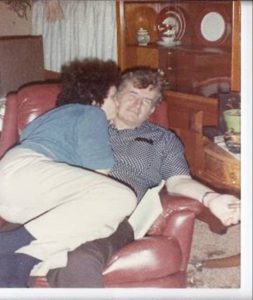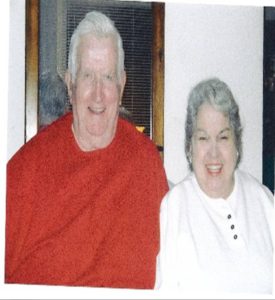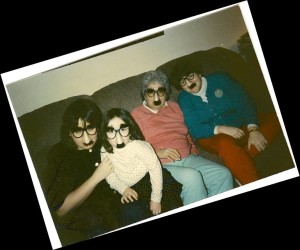How fitting that the fourth anniversary of the day my mom died, March 8, 2015, was International Women’s Day, which is set aside to celebrate the achievements of women around the world. And while the world is recognizing the legacies of gals like Sandra Day O’Connor, I’m taking time to reflect on the legacy of Peggy Fair O’Connor, whose world was a bit smaller, but whose legacy was just as powerful.
I know that people tend to be canonized in death, and that is not my intent. Nobody is perfect, including Mom, and she would be the first to critique that in my writing. But I think when someone dies, we often realize that we’ve wasted too much time in life dwelling on the negative, and resolve to attempt to dwell more on the positive going forward. In that spirit, I’d like to mention just a few of the lasting lessons Mom taught me; lessons learned somewhat by listening, but mostly by seeing her good example.
Love Unconditionally — and Especially Your Spouse
I remember asking , as many young kids do, “Who do you love more, us kids or dad?” I think a lot of parents try to tap dance around that question, not wanting to hurt anybody’s feelings. My mom opted for honesty and logic: “I have to love your dad first, because without him you wouldn’t be here.” That didn’t hurt my feelings; it made sense.
Throughout their almost 55 years of marriage, both my parents always exhibited the utmost in love and mutual respect. That’s not to say they always agreed, and in the later years especially there was a certain amount of the patented old folks bickering that I think stems mostly from the fact that one or both of them don’t hear as well as they used to.
But I never saw my parents have a fight. Not a real fight, with screaming and name calling and meanness. And you know what? My husband and I, going on 32 years of marriage, have never had a fight like that either. Because you learn from watching your parents.



Honesty and Integrity
Rachel’s fifth grade teacher, Mrs. Solomon, reminded the kids at their year-end program of the definition of integrity: doing what’s right when no one is looking. More than a decade later and I’ve never forgotten that – but it occurs to me I knew it all along. My mom just said it a different way: Right is right, and wrong is nobody’s right.
I know that if you get out to the car and find something overlooked in your cart, you go back into the store and pay for it. If you get too much change, you point it out and give back the difference. You don’t cheat on a test, or your taxes, or your spouse – no matter how easy it might be to get away with it.
And by the way, my sister, Suzie, insists that the saying was, “Right is right, and wrong is never right.” We good naturedly argued about that while talking to the priest during the planning session for Mom’s funeral. The fact that both of us remembered it, and wanted to be sure to get it right, probably told him as much as anything about the kind of mom she was.
Laugh and Have Fun
I gravitate toward people with a great sense of humor, and that undoubtedly started in the womb. I grew up in a household where everyone had a sharp wit, but always used that power for good instead of evil. When you’re smart and funny, it’s easy to be cruel, but, as you have probably figured out by now, that was never tolerated. Mom always wondered why Don Rickles was so popular, when all he did was call people names.
I also learned it is OK to be silly, look foolish and laugh at yourself – especially when amongst family. There was rarely a Christmas Eve when Mom didn’t have a bag of tricks ready for fun and frivolity – silly string, kazoos and noise makers, and the timeless classic: Groucho nose and glasses.
How to Cook the Really Important Stuff
I know what you’re thinking. The Irish Cookbook: the Smallest Book in the World. Yes, that’s true for the most part. Nonetheless, Mom taught me the critical essentials. Always use real butter. It’s impossible to get the beaters clean unless you’ve licked them first. It’s nice to know how to roast a turkey, but it’s more important to know how to make fudge from scratch.
I told Mom years ago that what I wanted for my “inheritance” was her 1956 Better Homes and Gardens Cookbook. She gave it to me years ahead of time, and it’s an interesting read. When you open the pages under Vegetables or Salads, the pages are as pristine as they were almost 60 years ago. When you turn to the sections on Cakes, Cookies and Candy Making, they are dog-eared, grease-stained and repaired with multiple generations of hole reinforcements.
I still haven’t been able to replicate Mom’s chocolate buttercream frosting, but every time someone from my generation tries my fudge, I invariably hear, “just like mom used to make.” You can’t get higher praise than that.
Not Just Tolerance, but Acceptance
I learned this weekend that Mom’s date of death coincided with the anniversary of the civil rights march on Selma, and I know that would make her very proud. She taught all of us how despicable bigotry and prejudice were, whether because of ethnicity, religion, sexual orientation, or anything else.
We grew up on the south side of Chicago, at 55th and Lowe. I assume when my grandparents bought the two flat that it was an all-white — and possibly all-Irish — neighborhood. In the 60s, the neighborhood started “changing,” the term in those times for whites moving out and other ethnicities moving in.
In those days, our new neighbors weren’t called Hispanic or African American. They were called Puerto Rican and colored – or worse. But all Mom called them was neighbors. Just as she had become a close friend with Mary Lou and Halton Newcomb — our decidedly non-Irish next door neighbors who had moved to Chicago from very rural Missouri — as new neighbors moved in Mom introduced herself and welcomed them. She was colorblind and, undoubtedly, helped some others feel the same way in return.
We moved from Chicago one month after the assassination of Martin Luther King, Jr. For that month, Mom had to walk all of us to school accompanied by our ferocious-looking German shepherd because of the hostility all around us. But there was none of that on the 5500 block of South Lowe Avenue, thanks in large part to Peggy O’Connor. Would that we all could be remembered for our own efforts to bring peace to our own little corner of the world.


Leave a Reply